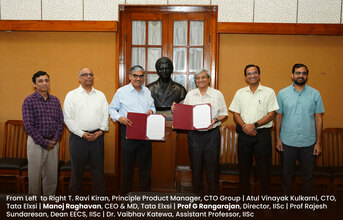
Advances in vehicle-to-vehicle and vehicle-to-anything (V2X) connectivity have presented more opportunities for theft, remote control, tampering, and siphoning of personal information.
Tata Elxsi, leading design and technology service providers across industries, announced the joint development of an Automotive Cyber Security Solution together with the Indian Institute of Science (IISc) under the framework of the existing Memorandum of Understanding (MoU). The partnership aims to address the challenges in cybersecurity presented by complex in-vehicle networks of sensors and numerous advancements in software that define the modern driving experience.
The collaboration will also focus on security and threat detection in connected automotive vehicles, using AI & ML-based intrusion detection. The partnership will also work to prevent and detect potential security threats and anomalies with preventive insights on future and potentially more advanced threats in the system.
This joint development will leverage Tata Elxsi's experience of artificial intelligence and machine learning skill set and the business foray towards software-defined vehicles (SDV) and EV solutions, coupled with the strength of advanced research at IISc, who are focusing on developing automotive vehicle technologies and network security, smart grids, and other critical systems.
Manoj Raghavan, CEO & MD, Tata Elxsi, said, "In the Connected vehicles space, we have made substantial investments to improve our solution stacks for Autonomous vehicles via our ADAS programme, SDV architecture, and the like. As vehicles increasingly rely on digital technologies, ensuring cybersecurity is paramount. With IISc's partnership focusing on Cybersecurity solutions and products, we are sure our clients and automakers can build safer, more resilient vehicles while providing peace of mind to end customers."
"In today's digital and interconnected world, cybersecurity threats are growing with technological advances. At IISc, we are always keen on academia-industry partnerships that can help address such challenges," said G Rangarajan, Director, IISc.
Rajesh Sundaresan, Dean, Electrical, Electronics and Computer Sciences (EECS) Division, IISc, said, "A modern car easily has upwards of 3000 chips sensing and controlling the car's operation. The design complexity associated with enabling safe in-vehicle networking is enormous."
